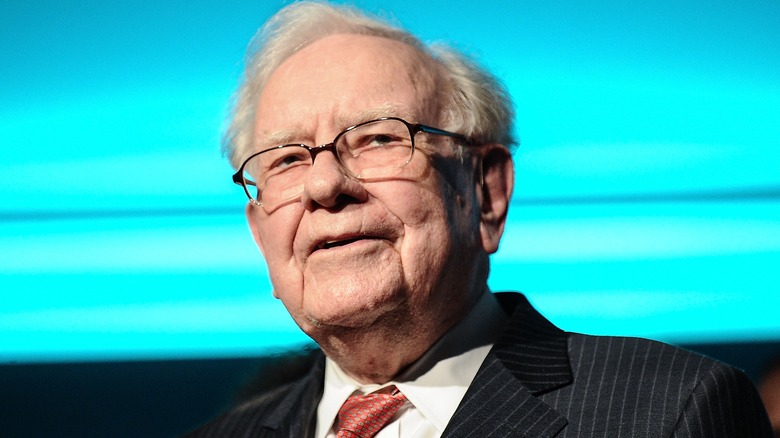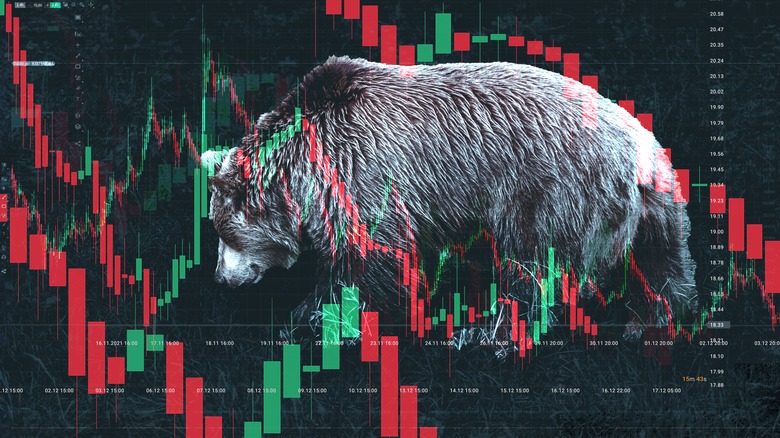Money Tips And Tricks You Can Steal From Warren Buffett
Warren Buffett, the CEO and Chair of Berkshire Hathaway, often finds himself the subject of conversations within finance circles. The investor and business icon has owned the company since gaining control in 1965. Since then, Berkshire Hathaway has grown from a few names in New England textile milling to a conglomerate holding company. The business enjoys a sizeable minority stake in some of the globe's largest brands including Apple, UPS, and Bank of America — as well as ownership of a wealth of private companies including Duracell, Geico, and Fruit of the Loom.
Its leader, Buffett, is a vocal proponent of smart personal investments for all types of individuals. He is outspoken about how everyday savers and investors can transform their financial well-being with intelligent behaviors and hard work. For Buffett, there's no easy way to get ahead, but with a strong work ethic and the right tools for success, making the world around you work to your benefit is entirely possible. Estimates of his net worth range from $106 billion to $124 billion. He often speaks publicly in an effort to impart some of his financial wisdom to others and is famously known for his modest lifestyle. These nuggets of financial advice may be just the thing you need to boost your savings and investment game to the next level.
Price is what you pay; value is what you get
One of Warren Buffett's most valuable pieces of advice surrounds the difference between price and value. The cost of an item or investment isn't a true representation of its value. Value, according to Buffett, is what you get from owning the thing. Prices are a fickle feature of marketplaces in constant flux. An asset could swing wildly in price throughout the day, leading buyers to pay wildly different prices for the same company stock. The same can be said for goods that you purchase. Amazon, for instance, is notoriously chaotic with pricing, changing price points on a wide range of items as often as every 10 minutes.
No matter what assets you're spending your money on, working out the best value means paying for things at discounted prices. While Buffett doesn't think people should only buy when prices recede (you might be stuck waiting forever to move on certain assets), doing the research and purchasing high-quality things at value-added prices is a surefire way to stay ahead of the financial curve. Another off-ramp here is the difference between rental and ownership. It might be easier said than done in some areas, but owning your home, car, or even software you use regularly typically works out to a better price-to-value relationship over the long term.
If I borrowed money at 18% or 20%, I'd be broke
Warren Buffett isn't big on the use of credit cards. Credit accounts are some of the highest-interest loans that can be found anywhere in the financial marketplace. Buffett considers cash to be king and doesn't suggest that people use credit cards at all, if possible.
A credit card can be a great asset in your back pocket, however. It's worth having some revolving credit in order to continue building a thriving credit score, and these instruments can act as a lifeline in an emergency. But the interest rates found on even the most reasonable credit cards are astronomical. An average card carries a rate of 24.45%, more than double that of a typical personal loan's 11.44% interest. For those who do use credit cards to rack up travel rewards or cash-back offers, paying them off in full every month is an absolute necessity. While Buffett suggests avoiding them altogether, shrewd cardholders can reap the rewards by treating them like a direct conduit to their bank account. Only spending based on what's available in cash will keep credit accounts under control and accruing benefits without added interest charges that can easily sink an otherwise steady financial ship.
Anything you invest in yourself, you get back tenfold
Investments aren't purely financial, and Warren Buffett will be the first to recommend continuous self-investment as a result. The savings goals and stock market movements you target can be fundamentally altered for the better with an additional avenue of investment brought into focus. Buffett suggests investing in yourself in pursuit of a continuous attitude of improvement.
Regardless of profession or hobby, practitioners are always looking to utilize the latest and greatest skills and knowledge to get the job done effectively and efficiently. Just like a golfer might analyze videos of their swing to dial in better shot mechanics, a teacher will pour over research surrounding novel teaching methods. The time and effort you spend improving yourself can't be taken away by anyone else. Buffett notes that money made in the stock market or real estate is always taxed, but knowledge gained in pursuit of better returns over the long haul is yours to keep in its entirety. Learning to read earnings reports, exploring the mechanics of a new indicator, or reading through real estate or bullion data will continuously improve your understanding of markets and opportunities, and this knowledge can't be diluted or taken away once it's been earned through personal investment.
You are right because your data and reasoning are right
Warren Buffett subscribes to a no-nonsense approach to investment that places data-driven analysis at the forefront. Speculation and crowd mentalities have no place in the Buffett school of stock trading.
In "The Warren Buffett Way," Robert Hagstrom says Buffett holds this tidbit from his own mentor close to his heart: "You are neither right nor wrong because the crowd disagrees with you. You are right because your data and reasoning are right." The takeaway from this mantra is that investors should develop and trust in their own instincts, analysis, and decision-making processes rather than relying on the prevailing wisdom of others. It's impossible to say how someone else came to their conclusion, but as an investor, you can develop your reasoning and data analysis processes to make your own sense of the marketplace.
For Buffett, investment success flows through a fairly simple pipeline. He identifies undervalued assets that are run by good teams (in the case of company stocks) and buys into them before the rest of the market catches on to the hype. The opinions of other investors don't count toward his decision-making paradigm, he simply follows the data and his own research.
[Put] 90% in a very low-cost S&P 500 index fund
Warren Buffett's 90/10 strategy is a product of the 2013 chairman's letter to Berkshire Hathaway shareholders. The approach is an ideal way to aggressively grow investment principal while protecting its value at the same time. However, it may not be right for all investors. The strategy involves putting 90% of all investment capital into low-cost index funds that track with the S&P 500. The other 10% he suggests investing in a short-term government bond asset. There's no need to get overly intricate with a long-term investment portfolio, investing in a broad market index fund grants access to the entire marketplace in a blended asset that's purpose-built to both protect investors against individual poor performances while capitalizing on the overwhelming upward momentum that the stock market as a whole enjoys. Investing in something that costs next to nothing in maintenance fees allows you to keep as much of the returns as possible, too.
More often than not, money managers looking to 'beat the market' with individual picks will come up short, and this trend only gets worse for investors the longer the timeline. An index fund strategy isn't attention-grabbing or flashy, but these investment assets are where the smart money thrives.
Someone's sitting in the shade today because someone planted a tree a long time ago
Short-term investments are rife with unneeded risk and underperformance. Warren Buffett is a gigantic proponent of long-term thinking and investment. The shorter your money sits in a growth-bearing position the more luck has to do the heavy lifting to meet targeted profits. The S&P 500 has seen an annualized return of just under 7% when adjusted for inflation over the last 150 years. While there have been some lean times within this lengthy snapshot, the reality is that invested wealth creates more wealth, and it does so increasingly efficiently when given additional time.
Buffet's analogy likens the generational grows of trees to the money you'll invest over your lifetime. A tree planted in your early years will blossom into a mighty canopy when you reach retirement age. The same is true for your investments. Broadly speaking, the longer your money works for you, the more of it you'll end up with. It's also worth noting that the largest trees in the forest started growing from their seeds long before even the oldest human alive today was born. As you think about long-term savings goals, it's important to think about both your own future and the financial "tree trunk" you'll be growing for your children.
Go to bed smarter than when you woke up
Warren Buffett is known for his voracious appetite for reading. He believes firmly in the translation of widespread reading habits (often regardless of the subject matter) to an improved investment capacity. For Buffett, the idea is a simple one: The more a person reads, the larger their knowledge base becomes. This creates an increasing reserve of actionable information stored.
Real, physical changes take place in the structure of the brain when reading is done regularly, and new pathways and frameworks of thinking are opened as a result. A reader will become a better problem solver, analyst, and confident decision maker, all because of the time spent training their brain. "That's how knowledge builds up. Like compound interest," he once quipped. According to Buffett, reading also helps him to be less impulsive in his investments: "I read and I think... I do more reading and thinking, and make less impulsive decisions than most people in business."
Taking time to learn something every day will keep you mentally sharp, giving you an edge when it comes to making new investments. This is also great when it comes to budgeting. The more time you take to sit and stew with your thoughts, the less likely you may be to make a rash decision on new spending.
You do things when the opportunities come along
Stressing over finding the next great investment will have you constantly chasing after average or even poor opportunities. Warren Buffett prides himself on careful, deliberate action; but he does things in full measure when the time comes to pull the trigger. Not every investment you make will pan out the way you hope or expect, but taking the time necessary to evaluate the quality of an opportunity will minimize the risk of getting sucked in on something that doesn't hold the appropriate value for your portfolio.
As such, investors who jump at every opportunity won't be in a great position to capitalize on a truly valuable one. Prevailing wisdom suggests that somewhere between 2% and 10% of any investments you own should be held in cash or cash equivalents. This allows for fast movement on a new asset while the iron is still hot. It's completely acceptable to wait out average investments in search of something that aligns more closely with your strategy and research.
When the tide goes out, you discover who's been swimming naked
When the market is humming, everyone in the investment game is buzzing. Financial advisors talk up stocks they like, and individual investors are quick to offer advice and conversational pieces to their friends. However, the market doesn't experience a constant upward trend, and there's a constant churn of company performance and economic weight that eventually creates market downturns, sometimes cataclysmic ones. The stock market has experienced 27 bear markets since 1928. A bear trading period is marked by a 20% fall in total strength from the previous high water mark, with an average duration spanning about 9.6 months.
Warren Buffett's tongue-in-cheek quip centers on the reality that many investors flee the market when things get tough. Hard economic times are a great way to judge a financial advisor's performance, a critical step in choosing someone to help you manage your retirement accounts and other investments. But hard times also act as a means to test your own mettle in the marketplace. Investment advice consistently sings the same refrain during times of hardship: Don't sell! The best thing you can do when markets begin to plummet is buy. The more you can invest during depressed price periods, the stronger your portfolio will be when the market inevitably rebounds. This approach ties in perfectly with Buffett's suggestion that investors should keep their eye on the long horizon.
We relish the dividends we receive...
Dividend earners are some of the best stocks that anyone can own because dividends are historically more stable than cash savings. Warren Buffett is a big proponent of adding solid dividend performers into the mix, and regularly advocates for them in his yearly investors letter.
The value of dividend earnings compound over time. Reinvesting dividends creates a steady trickle of growth that snowballs over time. The longer you own dividend producers and reinvest those earnings, the larger your pool of shares will become. Another important feature is in dividend yield data. There's a whole category of stocks in the market that are classified as "dividend aristocrats." These 65 companies have paid dividends to their investors for the last 25 years without interruption, and those payouts have continuously increased year over year. Purchasing a share of one today offers a fantastic chance of constantly improving dividend earnings for the long term. As an example, if you purchase a share of Company X for $100, and it pays out $10 per year in dividends, your yield will be 10%. But if next year the dividend earnings are boosted to $15, your cost per share remains the same ($100) while your dividend yield rises. Looking at trend charts of these dividend powerhouses drives home this message: Buy dividend producers that you believe in and keep them for the long haul.
Risk is part of God's game, alike for men and nations
No risk, no reward. Investing involves risk, even when it comes to the most certain of assets like bonds or CDs. With these types of guaranteed rates, the risk tends to fall more along the lines of opportunity cost, nevertheless, there remains a tradeoff and potential for failure with every investment you make. Risk is an inherent feature of life, and this remains true for investments. For Warren Buffett, the best way to mitigate risk is through research and careful consideration. Building out a strategy for success takes time, and it often involves plenty of stumbles and setbacks along the way.
Buffett isn't immune to the cruel whims of risk. In the 1990s he purchased Dexter Shoe for the equivalent of around $433 million in Berkshire Hathaway shares. Before the end of the decade, cheap foreign footwear had taken over the market, leaving the business to flounder. "To date, Dexter is the worst deal that I've made," Buffett noted in his 2007 shareholders letter. The trade amounts to a loss of almost $9 billion in class A shares of Buffett's brand (as of 2020). Even so, without risk, there is no reward, and traders of all backgrounds, skill levels, and financial assets must continue to trust in their instincts in order to play the game.
We enjoy the process far more than the proceeds
The longer you spend trading stocks, saving money, and building a thriving portfolio, the easier it can become to look ahead to the future with eager excitement. But the journey is just as important as the destination, as it delivers you to that shining future and will take up the lion's share of the adventure.
Warren Buffett doesn't just invest with an eye on some anticipated future. At 93 years old, Buffett hasn't made any moves toward retirement, because for him, the adventure lies not in what comes after earning his fortune but in the act of building it. Buffett became a billionaire in 1986 at the age of 56. As a result, he's spent nearly as much time continuing to work, learn, and earn as someone who doesn't have to as he did in building that fortune in the first place. Buffett takes pride in living below his means (which takes on an entirely different context given the gigantic net worth he has accrued), and his life's work is his passion. As an investor, it's up to you to make the journey meaningful, and this can be done by investing in companies that you believe in, and placing yourself at the center of your own successes. Building a robust investment strategy is an enjoyable process, and it will yield great rewards, both now and over the long term.
Cost really matters in investments
Cost can make or break an investment. The cost of any new position isn't just the price you pay for the asset, however. Embedded in the costs of your portfolio are management and maintenance fees, as well as other value reductions that take a bite out of your overall earnings. If you pay a money manager to care for your retirement portfolio, for instance, you'll be paying that advisor an average of 1% of the total value.
The same kinds of fees exist with index funds, annuities, and many other assets, and keeping these costs in perspective is a crucial piece of the puzzle. For his part, Warren Buffett suggests that these added costs can quietly eat away at your investment portfolio, and by extension the financial mobility that you enjoy later in life. "If returns are going to be 7 or 8 percent and you're paying 1 percent in fees, that makes an enormous difference in how much money you're going to have in retirement," he offers to the world.













